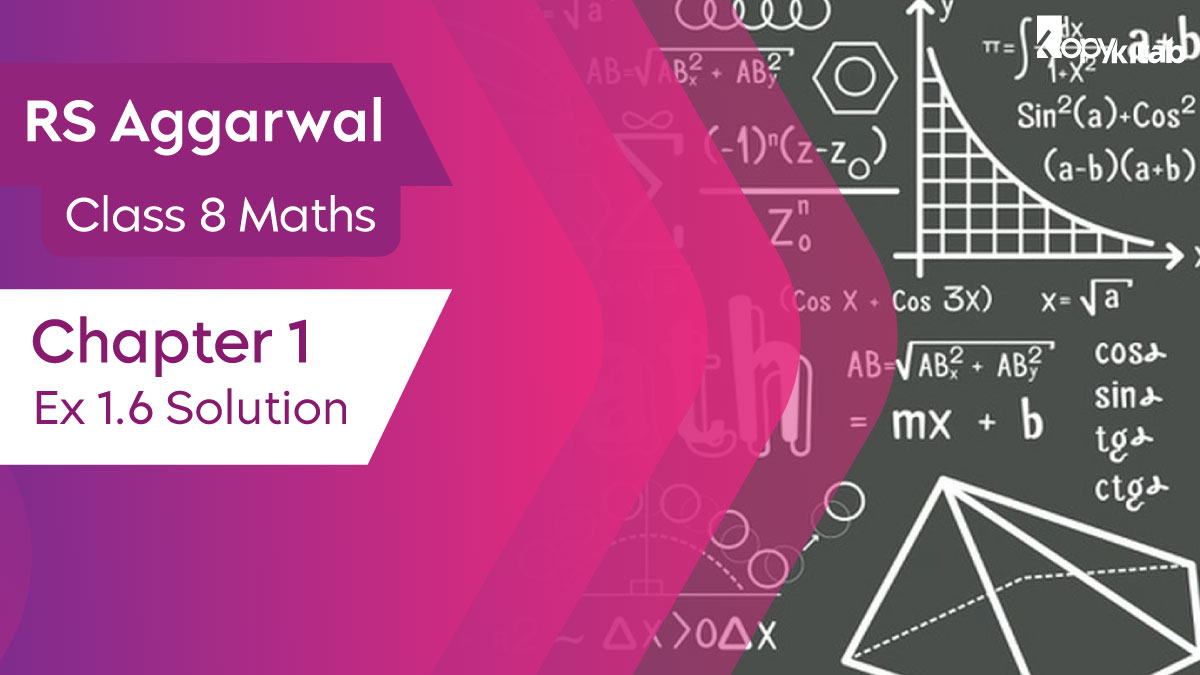
RS Aggarwal Class 8 Maths Chapter 1 Ex 1.6 Solutions – The experienced Mathematics faculty have prepared this exercise solution to ensure that the students are thorough with their basic concepts & assist them to clear their doubts. The students will learn the properties of rational numbers which include the existence of a multiplicative identity, multiplication by 0, distributivity of multiplication over addition. Each question is presented step by step along with the important definition & formulas.
RS Aggarwal Class 8 Maths Chapter 1 Ex 1.6 Solutions are framed by experts in accordance with the CBSE syllabus for the 8th Class. The exercise-wise solutions are explained in a simple & easily understandable language which assists students to excel in their exams. These solutions enable the students to revise the whole syllabus & prepare effectively for the final Maths exams & to secure excellent marks. The students can effortlessly study & practice this exercise solution in online as well as offline mode.
Access RS Aggarwal Class 8 Maths Chapter 1 Solutions PDF
Download RS Aggarwal Class 8 Maths Chapter 1 Ex 1.6 Solutions
RS Aggarwal Class 8 Maths Chapter 1 Rational Numbers Ex. 1.6 Solutions
Important Definition for RS Aggarwal Class 8 Maths Chapter 1 Ex 1.6 Solutions
- Closure Property of Multiplication of Rational Numbers
Rational Numbers are closed under Multiplication. Suppose 2 rational numbers a/b, c/d then their product (a/b x c/d) is also a Rational Number.
Assume 2 rational numbers 1/3 & 4/7
1/3 x 4/7 = 4/21
Thus, 4/21 is also a Rational Number.
- Commutative Property of Multiplication of Rational Numbers
Multiplication of Rational Numbers is Commutative. 2 Rational Numbers can be multiplied in any order. Suppose 2 rational numbers a/b, c/d then (a/b x c/d) = (c/d x a/b)
Assume 2 Rational Numbers 3/4 & 5/2
(3/4 x 5/2) = 3/4 x 5/2 = 15/8
(5/2 x 3/4) = 5/2 x 3/4 = 15/8
Thus, (3/4 x 5/2) = (5/2 x 3/4)
- Associative Property of Multiplication of Rational Numbers
Rational Numbers follow the Associative Property of Multiplication. While Multiplying 3 or more Rational Numbers they can be arranged in any order. Suppose Rational Numbers a/b, c/d, e/f then (a/b × c/d) × e/f = a/b × (c/d × e/f)
Assume Rational Numbers 1/2, 4/5, 6/4
(1/2 x 4/5) x 6/4 = (1x 4/2 x 5) x 6/4
= (4/10) x 6/4 = 4 x 6/10 x 4 = 24/40
1/2 x (4/5 x 6/4) = 1/2 x (4 x 6/5 x 4) = 1/2 x (24/20) = 24/40
Hence, (1/2 x 4/5) x 6/4 = 1/2 x (4/5 x 6/4)
- Existence of Multiplicative Identity Property
For a Rational Number a/b, (a/b x 1) = (1 x a/b) = a/b. 1 is the Multiplicative Identity of Rational.
Assume the Rational Number 4/3
(4/3 x 1) = (4/3 x 1/1) = (4 x 1/3 x 1) = 4/3
(1 x 4/3) = (1/1 x 4/3) = (1 x 4/1 x 3) = 4/3
(4/3 x 1) = (1 x 4/3) = 4/3
- Existence of Multiplicative Inverse Property
Nonzero rational number a/b has multiplicative inverse b/a.
(a/b x b/a) = (b/a x a/b) = 1
b/a is known as the Reciprocal of a/b. Zero has no reciprocal.
For instance: Reciprocal of 4/7 is 7/4 since 4/7 x 7/4 = 1
- Distributive Property of Multiplication over Addition
Consider 3 rational numbers a/b, c/d, e/f . Distributive Property states that a/b x (c/d + e/f) = (a/b x c/d + a/b x e/f)
Assume 3 Rational Numbers 1/3, 4/5, 7/8
1/3 x (4/5 + 7/8) = 1/3 x {(4 x 8 + 7 x 5) / 40}
= 1/3 x (67/40) = 67/120
(1/3 x 4/5 + 1/3 x 7/8) = (1 x 4/3 x 5 + 1 x 7/3 x 8)
= (4/15 + 7/24) = (4 x 8 + 7 x 5)/120 = 32 + 35/120 = 67/120
Hence, 1/3 x (4/5 + 7/8) = (1/3 x 4/5 + 1/3 x 7/8)
- Multiplicative Property of 0
Any Rational Number multiplied with 0 gives 0. For a Rational Number a/b, (a/b x 0) = (0 x a/b) = 0
For instance: (4/7 x 0) = (4/7 x 0/1) = (4 x 0/7 x 1) = 0
Similarly (0 x 4/7) = (0/1 x 4/7) = 0
Know more at the official website.
